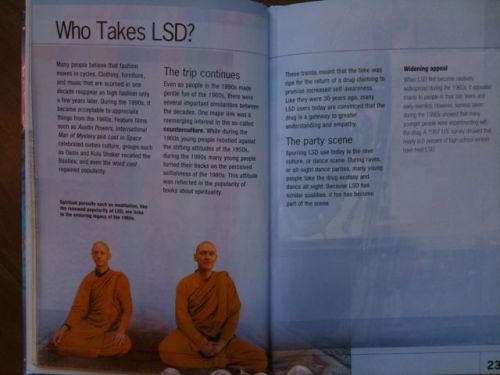I was looking through the library at a local high school (I was there as a judge for a Lego Robotics competition, it was on the up-and-up I swear) and found the section of books to scare kids away from drugs. This is a fairly progressive school and the books were negative but non sensational, for the most part, which I think is well within reason. But one page from one book,
Just the Facts: LSD struck me as particularly entertaining; I've attached a photo here. The text reads:
Who Takes LSD?
Many people believe that fashion moves in cycles. Clothing, furniture, and music that are scorned in one decade reappear as high fashion only a few years later. During the 1990s, it became acceptable to appreciate things from the 1960s. Feature films such as Austin Powers, International Man Of Mystery and Lost in Space celebrated sixties culture; groups such as Oasis and Kula Shaker recalled the Beatles; and even the word cool regained popularity.
The trip continues
Even as people in the 1990s made gentle fun of the 1960s, there were several important similarities between the decades. One major link was a reemerging interest in the so-called counterculture. While during the 1960s young people rebelled against the stifling attitudes of the 1950s, during the 1990s many young people turned their backs on the perceived selfishness of the 1980s. This attitude was reflected in the popularity of books about spirituality.
These trends meant that the time was ripe for the return of a drug claiming to promise increased self-awareness. Like they were 30 years ago, many LSD users today are convinced that the drug is a gateway to greater understanding and empathy.
The party scene
Spurring LSD use today is the rave culture, or dance scene. During raves, or all-night dance parties, many young people take the drug ecstasy and dance all night. Because LSD has similar qualities, it too has become part of the scene.
Widening appeal
When LSD first became relatively widespread during the 1960s, it appealed mainly to people in their late teens and early twenties. However, surveys taken during the 1990s showed that many younger people were experimenting with the drug. A 1997 US survey showed that nearly 8.5 percent of high school users have tried LSD.
The page has a photo of buddhist monks in orange robes, with a caption "Spiritual pursuits such as meditation, like the renewed popularity of LSD, are links to the enduring legacy of the 1960s."
To me, this reads like it was written by someone who is actually quite favorable to LSD and spirituality and the '60s, but was obviously under compunction to write something neutral and slightly dismissive at best; however, they're also almost endearingly naive... Still, underneath that, it is vaguely accurate, I'd say.






















There's a text uploaded at the website of the Polish Drug Policy Network (it's in Polish anyway ;)): a law student wrote an extremely interesting Master's thesis on whether people have a right to use drugs - topics like moral rights, paternalism, right to privacy, protection of drug users' rights under different control regimes (prohibition, depenalisation and decriminalisation, legalisation)... (I even sense some "pro-psychedelic bias" in the text, my "gaydar" tells me the author has a "psychedelic drug orientation" too... ;)) At some point the author critisises the gateway drug theory for offering a simplistic explanation of reasons for using various drugs, presenting them as pursuit of ever stronger experience, while people can have diametrically differing reasons for doing so.
Actually what is most surprising for me is finding that argument a rebours as a pro-psychedelic argument. Just a few weeks ago a debate was hosted at the Brave New World cultural centre in Warsaw (a cultural centre created by Political Critique, an independent New Left think tank) under the provocative title "Is pot smoking revolutionary?". A friend of mine presented a strong psychedelic perspective, I acted a bit as his ground control, trying to make pro-psychedelic arguments more rational and acceptable. Anyway, he said things like: people should be aware that the strongest psychoactives are completely non-addictive, maybe then people wouldn't turn to more harmful drugs...And this is precisely the gateway drug logic, albeit from a very different perspective, it's the same implication: that people want just to experience stronger and stronger effects. I definitely can't agree with that: reasons for taking various types of drugs are very different and most definitely psychedelics wouldn't be able to "replace" opiates because opiate abuse is a function of broader social problems. It WAS of course curious to hear such arguments used in this way, but still I don't think it helps - the best solution to problems caused by addictive drugs is to address socioeconomic problems which lie underneath.
Anyway - back from this anecdote - I believe it's a matter of honesty and responsibility to stress that people can and do have various reasons for taking (various) drugs. Maybe this book stops short of this because it would show how legitimate the reasons for taking psychedelics can be?
The comments posted here do not reflect the views of the owners of this site.